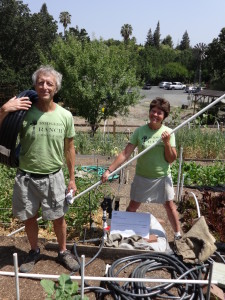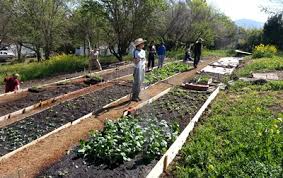 Throughout California’s 112 community colleges faculty members are active as entrepreneurs and creators of businesses. “Farmer John” Matthesen, a faculty member in the Culinary department at Diablo Valley College (DVC) in Contra Costa, has had several careers as an entrepreneur in California. His current career finds him deeply involved in two of California’s growing industries, urban agriculture and agriculture technology (“ag tech”).
Throughout California’s 112 community colleges faculty members are active as entrepreneurs and creators of businesses. “Farmer John” Matthesen, a faculty member in the Culinary department at Diablo Valley College (DVC) in Contra Costa, has had several careers as an entrepreneur in California. His current career finds him deeply involved in two of California’s growing industries, urban agriculture and agriculture technology (“ag tech”).
In the most recent EDD jobs report for June 2015, agriculture employment totaled 403,200 jobs statewide—not among the top-employing sectors, but still a main employer in the state. The great majority of these jobs are in large farms in the Central Valley and other agricultural areas of the state. But there is also a growing urban agriculture (urban ag) movement, whose employment impacts reach into food services as well as agriculture.
Matthesen is a leader in this urban ag movement in the East Bay. He and his wife, Marian Woodard (pictured above) helped found the Rodgers Ranch Urban Farm in 2012, which is a working farm on 2 acres in suburban Pleasant Hill.
Matthesen, known by his students as “Farmer John”, graduated from the University of Colorado, and spent 12 years in the hospitality field, in a range of jobs in hotels and restaurants. In 1987 he shifted fields to take a job with Sybase, the rapidly growing software firm then in Emeryville. For the next nearly 25 years he was active in software start-ups, including for some years as a member of a venture capital firm in San Francisco. Woodard is a graduate of UC Davis / Master Gardener program.
They were drawn to urban agriculture as a movement that combined environmental and social values with entrepreneurial opportunities for a new generation of entrepreneurs. Rodgers Ranch was launched in 2012, primarily as an educational venue, to teach local residents and DVC culinary students the food growing process. Matthesen and Woodard developed a course, “Farm-to-Table” that has now been designated as mandatory for graduation for those seeking their Culinary degree.
 Rodgers Ranch Urban Farm takes its name from the original farm, started in 1867 and originally covering 149 acres. By the 1970s, nearly all the original ranch had been sold off for residential and commercial development. The local historical association was able to save a 2 acre section with the farmhouse and barn. In 2011, Matthesen and Woodard proposed using the 2 acres as an urban farm, and launched the urban farm in winter 2012.
Rodgers Ranch Urban Farm takes its name from the original farm, started in 1867 and originally covering 149 acres. By the 1970s, nearly all the original ranch had been sold off for residential and commercial development. The local historical association was able to save a 2 acre section with the farmhouse and barn. In 2011, Matthesen and Woodard proposed using the 2 acres as an urban farm, and launched the urban farm in winter 2012.
The farm today grows a wide variety of high-nutrition vegetables, including lettuces, radishes, broccoli, and cauliflower in the winter, squashes, dozens of types of tomatoes, peppers, eggplants, cucumbers, quinoa and okra in the summer. The growing process is based on principles of sustainability, as well as bio-intensive (high yield/ high density) techniques that Matthesen and Woodard embrace. “Our lettuce, for example, is not meant to compete with iceberg lettuce from Salinas; we grow heirloom varieties that are far richer in anti-oxidants and nutrition,” Matthesen explains.
The farm is a volunteer effort, with community volunteers coming every day and the largest number (usually 12-14) on Saturdays. Volunteers cover the gamut in backgrounds and interests. Many want to learn how to build their own gardens; others have small homes or apartments with no space for gardens. There are also always a few entrepreneurs testing products, such as bio-char and natural bug repellents.
For the DVC culinary students who also work on the farm, there are more direct employment benefits. According to Matthesen, “Restaurants are looking to hire chefs – who understand the food growing process. Thanks to pioneers and thought leaders like Alice Waters and Michael Pollan, restaurants are cultivating and buying from local farms. They want workers who can participate in the process, or at least understand the process. Not only is farm-to-table a trend in restaurants, corporations like Google, hospitals and even Walmart are all heavily involved. Knowledge of farm-to-table is a clear resumé enhancement, and absolutely increases job opportunities.”
Beyond employment, Matthesen hopes the main impact of his efforts at Rodgers Ranch and beyond will be in promoting entrepreneurship in the urban ag and ag tech areas. He himself is involved in several ag tech startups, in what he sees as the promising three fields of vertical farming (cultivating plant life within high rises or other vertical structures), hydroponics (cultivating plant life using nutrient solutions in water, without soil), and Precision Ag (systems to limit the overuse of water and chemicals).
Matthesen explains that “Our mission is to inspire an entrepreneurial spirit. My objective is to help form and launch as many startups as possible that have to do with ag and food tech. It’s not so much about becoming a farmer as it is to solve world problems of food and water.”
“I teach culinary students that they too can participate in the Silicon Valley startup environment. We live in the best place in the world for startups and investors, and it shouldn’t be just for a narrow segment of society.”
“And besides – you can’t eat software.”

